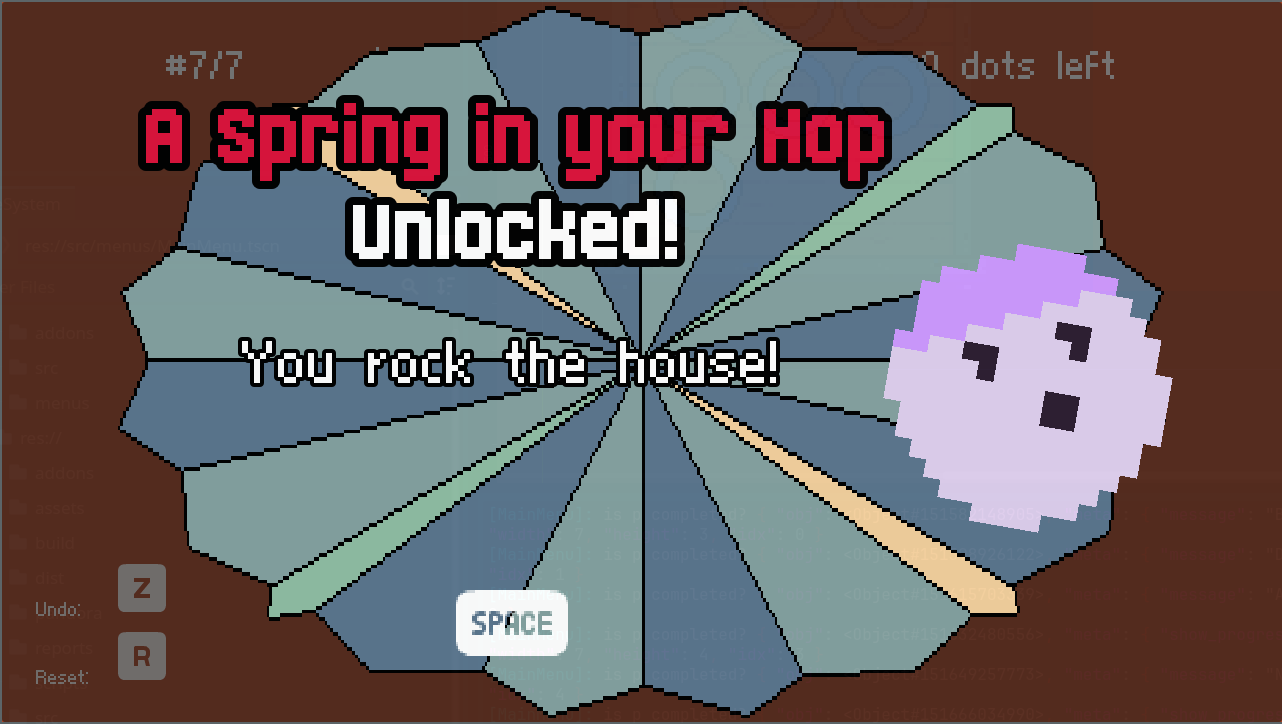Thank you, I'm glad you like it! I like pixel art b/c it's so constrained, so it helps me relax and just fit whatever i can in the space. Hope you like the game!
russmatney
I added a more celebratory new-puzzle-set-unlocked screen to Dot Hop yesterday:

Dot Hop is launching March 1st (next Friday)! Originally prototyped as Flower Eater in the Fediverse Summer Jam - now re-implemented in Godot, with ~50 more puzzles (and many more to come!)
Check it out on steam and on github, or watch a short devlog about it on youtube
I’m going for zig and gerbil this year! Love AOC for learning new langs a day at a time :)
Dang, haven’t heard of this, looks pretty cool!
I’m going to try to use both zig and gerbil. Usually i use clojure, so might fallback to that as well. I started doing puzzles from 2015 this week, and that’s been fun so far
In fact i did not know that! Thanks for the vid, will check it out!
https://godotwildjam.com runs every month for the last …60+ months?! Feels like a long time!
Anyway, It’s a great community of godot game devs!
Just to share a perspective from erlang/elixir: pattern matching to filter for only happy-path inputs and the principle of “letting it fail” (when the inputs don’t match the expected shape) works really well in some paradigms (in this case, the actor model + OTP, erlang’s 9 9s of uptime, etc). In that kind of architecture you can really only care about the happy path, because the rest is malformed and can be thrown away without issue.
I think of this as interactive development, or repl-driven development. You can work this way today in Clojure (frontend, backend, and lately even for scripting via babashka), and with lisps in general - the syntax lends itself to sending expressions to the repl and returning values to your editor.
It’s really the best way (my favorite, at least) to program that i’ve found for exactly the reasons you mentioned - it’s excellent for debugging and ensuring the behavior of small functions with minimal overhead.
Types are frustrating because they lock things up and they don’t guarantee behavior, which is really all a program cares about. I feel similarly about unit tests… it’s extra code locking up your behaviors, so make sure they’re what you actually want! A general problem with types is that you have to commit to some shape early, which can lead to premature design and basically some arbitrary DSL when you just needed a couple functions/transformations. Feels like the problem of OO at times.
On the other side, the trouble (beyond people generally not wanting to read/learn lisps, which is unfortunate) is that repl-driven dev requires that you take care of your tools, which means there’s a tough learning curve and then some maintenance cost for whatever editor you want to use.
At a career-level scale, in my opinion, the investment is well worth it, but it’s a tough thing to figure out early in your career. I expect most devs with a couple years of js/python see types and feel like it’s a huge relief, which is real, and maybe types make sense at a certain team size…
I think people should spend time in several different languages and paradigms - it makes the ones you go back to make more sense :D
One thing i undervalued for most of my career was just reading code.
Get into the habit of digging into open source repos that catch your curiousity, and try to grok the way the project is layed out, what namespaces/files exist, what some of the core functions are, where the complexity is housed.
It’s all about getting exposure to patterns, especially if there aren’t other people to work with in your day to day.
excited for this one, thanks for putting it together! And thank you for not overlapping with the GMTK jam :D
A steam link would be nice!
https://store.steampowered.com/app/2779710/Dot_Hop/
Got dropped b/c i also included the image, i think [update: realized can edit the original post, so the link is in there now]